
American Journal of Cancer Research
Scope & Guideline
Transforming Knowledge into Cancer Care
Introduction
Aims and Scopes
- Molecular Mechanisms of Cancer:
Research exploring the genetic, epigenetic, and metabolic alterations that drive cancer initiation and progression, including studies on oncogenes, tumor suppressor genes, and signaling pathways. - Novel Therapeutic Strategies:
Investigations into new treatment modalities, including targeted therapies, immunotherapies, and combination therapies that enhance the efficacy of existing treatments. - Cancer Epidemiology and Risk Factors:
Studies assessing the epidemiological trends, risk factors, and outcomes associated with various cancer types, aiming to identify preventive strategies. - Cancer Microenvironment and Immunology:
Research delving into the tumor microenvironment, including interactions between tumor cells and immune cells, and how these interactions influence cancer progression and therapy response. - Translational Research:
Efforts to bridge laboratory discoveries with clinical applications, focusing on biomarkers for diagnosis, prognosis, and treatment response in cancer patients. - Technological Innovations in Cancer Research:
Utilization of advanced methodologies such as machine learning, bioinformatics, and imaging techniques to improve cancer diagnosis, treatment planning, and monitoring.
Trending and Emerging
- Targeted and Personalized Therapies:
There is a growing emphasis on research exploring targeted therapies tailored to specific genetic profiles of tumors, including studies on resistance mechanisms and combination therapies. - Immunotherapy and Cancer Immunology:
A significant increase in publications related to immunotherapy, including immune checkpoint inhibitors and CAR-T cell therapies, highlighting the importance of harnessing the immune system in cancer treatment. - Microbiome and Cancer Interactions:
Research exploring the role of the microbiome in cancer development, progression, and treatment response is gaining traction, underscoring the complex interactions between host microbiota and cancer biology. - Liquid Biopsy and Biomarkers:
Emerging studies focusing on liquid biopsy techniques and the identification of biomarkers for early detection, prognosis, and monitoring of treatment responses are trending. - Cancer Metabolism:
An increasing number of studies are investigating the metabolic reprogramming of cancer cells and its implications for therapy, reflecting the importance of targeting metabolic pathways in cancer treatment.
Declining or Waning
- Traditional Chemotherapy Studies:
Research focused solely on traditional chemotherapeutic agents without exploring new combinations or targeted approaches is becoming less prevalent as the field moves towards more personalized medicine. - Basic Laboratory Studies:
There is a trend away from purely basic laboratory studies that do not incorporate translational or clinical relevance, as the journal emphasizes studies that can lead to practical applications in patient care. - Single-Agent Drug Trials:
Publications reporting on the efficacy of single-agent drug trials are less common, reflecting a shift towards combination therapies and multi-modal approaches in cancer treatment.
Similar Journals

Cancer Biology & Medicine
Unlocking Insights in Cancer ResearchCancer Biology & Medicine is a distinguished Open Access journal published by the China Anti-Cancer Association, dedicated to advancing research and understanding in the fields of Cancer Research and Oncology. Since its inception in 2012, the journal has provided a vital platform for the dissemination of high-quality research, evidenced by its impressive ranking within the Q1 and Q2 categories of oncology and cancer research as of 2023. With a significant impact factor and a Scopus ranking of #64 in Medicine/Oncology and #55 in Biochemistry, Genetics, and Molecular Biology, it plays a crucial role in shaping the future of cancer biology. By offering open access to its content, the journal ensures that pivotal research findings are readily available to researchers, professionals, and students globally, thereby fostering collaboration and innovation in cancer research. Situated in Tianjin, China, this journal is poised at the frontier of oncology research, making a significant impact through its rigorous peer-reviewed articles that address critical challenges in the field.
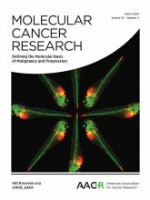
MOLECULAR CANCER RESEARCH
Elevating Understanding of Cancer at the Molecular LevelMOLECULAR CANCER RESEARCH, published by the American Association for Cancer Research, stands as a pivotal journal in the fields of cancer research, molecular biology, and oncology. With an impressive impact factor and recognized as a Q1 journal in its respective categories for 2023, it serves as an essential resource for researchers, professionals, and students aimed at advancing our understanding of cancer mechanisms and therapies. The journal, identified by the ISSN 1541-7786 and E-ISSN 1557-3125, provides a platform for cutting-edge research and clinical applications, emphasizing innovation and collaboration within the scientific community. With its focus on high-quality, peer-reviewed articles, MOLECULAR CANCER RESEARCH is vital for anyone looking to stay abreast of significant advancements in cancer biology and treatment strategies. For more details and to access the journal's content, please visit the publisher's link.

NEOPLASMA
Exploring Innovations in Cancer TreatmentNEOPLASMA is a prominent journal published by AEPRESS SRO, dedicated to the multifaceted field of oncology and cancer research. Since its inception in 1957, this esteemed publication has served as a vital platform for advancing the understanding of neoplastic diseases, disseminating high-quality research findings that contribute to clinical and laboratory advancements. Operating under a robust framework of peer review, NEOPLASMA holds significant credibility, as evidenced by its Q2 ranking in the Medicine (miscellaneous) category and Q3 rankings in both Cancer Research and Oncology for 2023. Furthermore, with an ISSN of 0028-2685 and E-ISSN 1338-4317, the journal fosters accessibility to valuable scientific content despite the absence of open access options. Positioned in Bratislava, Slovakia, NEOPLASMA continues to attract a global readership, making substantial contributions to the fields of biochemistry, genetics, and molecular biology as highlighted by its Scopus rankings. This journal is essential reading for researchers, professionals, and students looking to stay abreast of the latest developments in cancer research and treatment strategies.

CANCER GENE THERAPY
Transforming Cancer Care Through Genetic InsightsCancer Gene Therapy, published by SpringerNature, stands at the forefront of research in the fields of cancer research, molecular biology, and molecular medicine. With a robust impact factor reflecting its significant influence—ranking in the Q2 category for cancer research and Q1 for both molecular biology and molecular medicine—it serves as an essential resource for scholars and practitioners alike. Since its inception in 1994, the journal has dedicated itself to advancing the understanding and therapeutic application of genetic innovations in oncology. Notably, it holds distinguished Scopus ranks, placing it among the top tier journals in its categories, underscoring its importance to the scientific community. While open access options are not available, the compelling research published here offers invaluable insights into the latest advancements and strategies in cancer therapy. Engaging with *Cancer Gene Therapy* not only keeps professionals informed but also inspires future innovations in the quest for effective cancer treatments.

Journal of the Egyptian National Cancer Institute
Innovating cancer care with groundbreaking research.Journal of the Egyptian National Cancer Institute, published by SPRINGER, serves as a vital platform for disseminating innovative research in the field of oncology and cancer research. With both ISSN 1110-0362 and E-ISSN 2589-0409, this Open Access journal has been committed to making significant contributions to the scientific community since its inception in 2005. Operating from its base in Egypt, it has established itself as an important resource for researchers, practitioners, and students alike, offering insights into contemporary issues and advancements in cancer care. Recognized in the 2023 category quartiles as Q3 in Cancer Research and Q3 in Oncology, the journal is positioned to impact the ongoing discourse in cancer treatment strategies and health policy. As it continues to publish peer-reviewed articles through available Open Access avenues, the Journal of the Egyptian National Cancer Institute remains dedicated to enhancing the knowledge base and collaborative efforts within the global cancer research community.
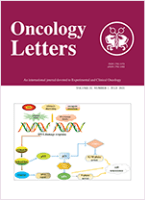
Oncology Letters
Elevating Oncology Discourse for Better Patient OutcomesOncology Letters is a prominent academic journal dedicated to disseminating high-quality research in the fields of oncology and cancer research. Published by SPANDIDOS PUBL LTD and based in Greece, this journal has established a significant presence since its inception in 2010 and continues to contribute to the scientific community with a focus on both clinical and experimental oncology. Notably, it holds a respectable Q3 ranking in the categories of Cancer Research and Oncology as of 2023, highlighting its relevance and contribution to these critical fields. With a Scopus rank of #139/404 in Medicine – Oncology and #117/230 in Biochemistry, Genetics, and Molecular Biology – Cancer Research, Oncology Letters serves as a valuable platform for researchers, professionals, and students alike to explore emerging findings and innovative treatment approaches. Though it operates within a traditional subscription model, this journal prides itself on fostering accessible and impactful discourse in oncology, making it an essential resource for those committed to advancing cancer research and improving patient care.
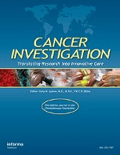
CANCER INVESTIGATION
Driving innovation in cancer studies for impactful discoveries.CANCER INVESTIGATION is a distinguished peer-reviewed journal published by Taylor & Francis Inc, dedicated to the advancing field of cancer research and oncology. With an ISSN of 0735-7907 and E-ISSN of 1532-4192, this journal has been a pivotal resource for professionals and researchers since its inception in 1983, continually contributing to the evolving landscape of cancer investigation until its convergence in 2024. CANCER INVESTIGATION boasts noteworthy rankings in 2023, including Q3 in Cancer Research and Q2 in Medicine (miscellaneous), highlighting its relevance and impact in these critical areas. The journal's commitment to disseminating innovative research and comprehensive reviews makes it an essential platform for those engaged in cancer studies and related disciplines. While currently not available as an open-access publication, CANCER INVESTIGATION remains an invaluable tool for understanding the complexities of cancer, offering insights that drive scientific advancements and improve patient outcomes.
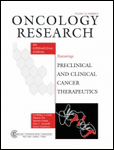
ONCOLOGY RESEARCH
Exploring Innovative Strategies for Cancer TreatmentONCOLOGY RESEARCH, published by TECH SCIENCE PRESS, is a vital academic journal dedicated to the rapidly evolving field of oncology. With its ISSN 0965-0407 and E-ISSN 1555-3906, the journal serves as a key resource for researchers, clinicians, and academicians committed to advancing cancer research and treatment strategies. Operating without an Open Access model, ONCOLOGY RESEARCH provides high-quality, peer-reviewed articles that cover diverse topics within cancer research, medicine, and oncology, with its 2023 Scopus ranking placing it in the Q3 quartile. The journal's commitment to facilitating rigorous scientific discourse is evident in its historical breadth, with a publishing history dating back to 1992. ONCOLOGY RESEARCH is not only significant for the academic community but also plays a critical role in fostering new insights and approaches in the fight against cancer, making it a must-read for those involved in this critical area of study.
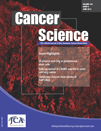
CANCER SCIENCE
Pioneering discoveries in cancer biochemistry and genetics.Cancer Science, an esteemed journal published by Wiley, stands at the forefront of oncology research, boasting an impressive impact factor and a classification in the Q1 category for its contributions in Cancer Research, Medicine, and Oncology as of 2023. Since its inception in 2003 and transitioning to an Open Access model in 2014, the journal has facilitated global dissemination of critical research findings, ensuring that vital information remains accessible to researchers, clinicians, and students alike. With its comprehensive scope covering cutting-edge discoveries in cancer biochemistry, genetics, and molecular biology, Cancer Science is recognized for its rigorous peer-review process and significant contributions to advancing our understanding of cancer. The journal, located at 111 River St, Hoboken, NJ, is an essential resource for anyone dedicated to improving treatment outcomes and pushing the boundaries of cancer research.

BIOCHIMICA ET BIOPHYSICA ACTA-REVIEWS ON CANCER
Advancing the Frontiers of Cancer ResearchBIOCHIMICA ET BIOPHYSICA ACTA-REVIEWS ON CANCER, published by Elsevier, has established itself as a leading journal in the domains of cancer research, genetics, and oncology, holding a prestigious position in the Q1 quartile rankings in these fields as of 2023. With an ISSN of 0304-419X and an E-ISSN of 1879-2561, this journal aims to disseminate high-quality, impactful reviews that synthesize the latest advancements and findings in cancer biology, treatment modalities, and genomic studies. Its robust indexing and remarkable Scopus rankings—placing it in the 95th to 91st percentiles across various categories—underline its significance for researchers, clinicians, and students passionate about oncology. Operating from its Netherlands headquarters, BIOCHIMICA ET BIOPHYSICA ACTA-REVIEWS ON CANCER is dedicated to fostering a comprehensive understanding of the complex biological mechanisms underlying cancer, promoting innovative therapeutic strategies, and guiding future research directions.